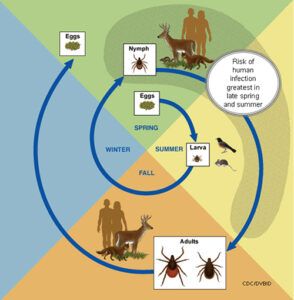Lyme Disease Complications
Lyme Disease Prognosis
If diagnosed in the early stages, Lyme disease can be cured with antibiotics. Without treatment, complications involving the joints, heart, and nervous system can occur. However, these symptoms are still treatable. Rarely, a person may continue having symptoms that can interfere with daily life even after they have been treated with antibiotics. Some people call this post-Lyme disease syndrome. The cause for the persistance in symptoms is unknown.
Lyme Disease Complications
Stage 3, or late disseminated, Lyme disease can cause long-term joint inflammation (Lyme arthritis) and heart arrhythmias (irregular heartbeats). Brain and nervous system problems are also possible, and may include:
- Decreased concentration
- Memory disorders
- Nerve damage
- Numbness
- Pain
- Headache
- Paralysis of the face muscles
- Sleep disorders
- Vision problems
- Anxiety or depression
Diagram Courtesy of the Center For Disease Control

Post-Lyme Disease Syndrome
Lyme disease is a curable condition. Nearly all patients (95%) improve after a short course of antibiotics. In very rare cases, patients continue to complain of persistent non-specific symptoms, such as fatigue, muscle aches, cognitive problems, and headache lasting years after completing antibiotic treatment for the initial infection.
This syndrome, which resembles chronic fatigue syndrome (CFS) or fibromyalgia, is referred to as post-Lyme disease syndrome. In the past, it has been called “chronic Lyme disease.” However, based on many reviews of scientific literature, researchers and doctors strongly believe that Lyme disease does not have a chronic state. According to the 2006 guidelines from the Infectious Diseases Association of America, post-Lyme disease syndrome is the preferred name for this condition.
Patients are considered to have this syndrome if they still have symptoms 6 months after treatment. Most important, there must be definitive evidence that the patient was originally infected by the B. burgdorferi spirochete. If there is no documented evidence of infection, it could be that the patient never had Lyme disease, or may be experiencing a new or different type of illness. If the patient did have Lyme disease, symptoms should eventually resolve without additional antibiotic treatments. Antibiotics are not helpful for post-Lyme disease syndrome.
Courtesy of NY Times
